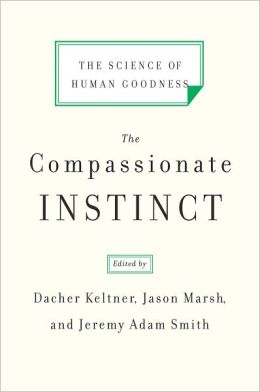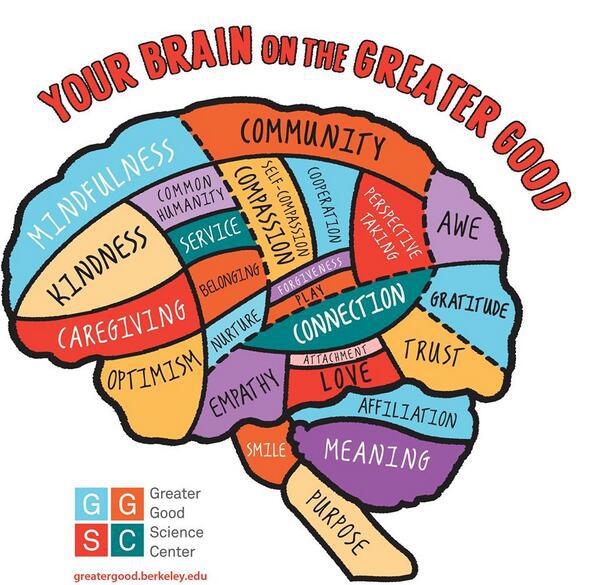Mindful Sex Through Compassionate Communication and Touch
Okay, You Got Us. These Are Tips for Guys!
You might love your partner truly, madly, deeply. But do you love compassionately? Take the Compassionate Love Quiz!
Pretty much everyone is hardwired for sex. Birds do it, I’m told. So do bees. Men do it as well, but many women would agree with me that there’s always room for improvement. Science can help, gentlemen, and here are three hot tips straight from the Greater Good Science Center.
1. Let your heart be present. Friends, I want you to watch this video and think about sex.
That handsome guy is Jon Kabat-Zinn, one of the world’s leading experts on mindfulness, the moment-to-moment, non-judgmental awareness of what’s happening in our bodies and minds.

So what might mindful whoopee look like? Well, you’re not supposed to be running a porno in your brain or agonizing about next year’s marketing budget. You’re not evaluating your own studly performance or dwelling upon what your beer gut looks like from a feminine point of view. You’re not sorting experiences and thoughts in negative and positive buckets.
Instead you’re taking Jon’s insights and applying them to making the Buddha with two backs: paying attention to your breathing and to your partner’s breathing, to your moans and to those of your partner, to the feel of skin on skin, to … whew, pardon me, my computer’s getting warm.
In other words, you’re absolutely present with your partner and with the moment. As Jon says, “When you hear the word ‘mindfulness,’ you have to understand that it is ‘presence of heart.’”
To some people, mindfulness during sex comes naturally. But, alas, it’s also very natural for our minds to wander or for anxiety to eat away at the edges of our awareness (and enjoyment). This seems especially true for parents of young children. My wife and I both fret that our son will wake up in the night and try to find mommy and daddy while we’re having special mommy and daddy time. But worrying about that possibility doesn’t make it any less likely to happen, does it? So why not just go with it, and let the future take care of itself?
Or so I tell myself. Do I listen? Not usually, no. But do as I say, gentlemen, not as I do. Your wife will thank me for it.
2. Think like a zebra. If you’re a zebra and a lion attacks, stress makes sense. As neuroendocrinologist Robert Sapolsky points out in a Greater Good Science Center talk he gave last year, our bodies secrete adrenaline and many other hormones to deal with short-term physical crises. Evolution bequeathed us this stress response so that we could escape lions, and it’s great for that.
It’s not so great for erections. Because when we’re running from lions, erections are kind of silly. That’s just not the time for pleasurable reproductive activities.
The problem is, that same stress response kicks in for the modern gentleman when he’s faced with his everyday worries, from traffic jams to utility bills to tomorrow’s Powerpoint presentation. And he stinks at turning off those worries when he enters the bedroom.
The zebra doesn’t have that problem: When he’s not running from the lion, he’s pretty carefree. There’s no such thing as performance anxiety when you’re a zebra. That’s why the freaking zebra has a better sex life than you do. While you’re sitting there worrying about your job evaluation, there are zebras having special mommy and daddy time.
The point, my friend, is that you need to get a grip. Daily stress is a sex-killer. In 21st century America, it’s also pervasive, possibly inevitable. As I write, I’m actually stressed that I won’t finish this article in time for Valentine’s Day. People are depending on me. Guys like you need this article, or your Valentine’s Day is going to suck. So how can we deal with the pressure and think more like zebras, and thus enjoy the same firm, dependable erections they do?
 Lucky for you, Greater Good is filled with excellent tips for preventing stress. In her Raising Happiness blog, Christine Carter suggests a few: making a list of all the things that make you stressed so that you can deal with them; changing your routine and make plans that take the stress out of your day; building your coping capacity through sports or yoga or whatever else floats your boat; and prioritizing your own health and happiness. Many studies suggest thatpracticing compassion and forgiveness reduce stress.
Lucky for you, Greater Good is filled with excellent tips for preventing stress. In her Raising Happiness blog, Christine Carter suggests a few: making a list of all the things that make you stressed so that you can deal with them; changing your routine and make plans that take the stress out of your day; building your coping capacity through sports or yoga or whatever else floats your boat; and prioritizing your own health and happiness. Many studies suggest thatpracticing compassion and forgiveness reduce stress.
This especially applies to our intimate relationships, where we can stress ourselves out over the wrong word or a sideways glance. “What we don’t like is that when we trust somebody intimately… we’re opening ourselves up to pain because we are unprotected and they’re seeing us naked, physically and emotionally,” says forgiveness expert Fred Luskin in a recent talk for our Science of Meaningful Life series.
Lots of guys can’t deal with that—being vulnerable—and the result is sex-killing stress.
Fred’s advice? Instead of stressing about how the ruling superbabe in your life may or may not have done you wrong, look for what’s awesome in her, and work on accepting the things that make her as screwed-up as you are.
3. Don’t fear the astronaut. Communication. Are you for it or against it? I know the answer should be obvious, but I ask because some guys are against it. I know I am. Oh, sure, I have many pious and high-minded rhetorical points to make about the value of communication, and, hell, I communicate for a living. But, um, sometimes my ideals and professional experience doesn’t translate into actions—or rather, words—at home. Just ask my wife.
“I met recently with a man whose marriage is being smothered by the weight of everything unsaid,” writes neuroscientist Rick Hanson, who I’m pretty sure was not thinking of me. “But not talking is what’s actually blowing up their relationship—and, in fact, when people do communicate in a heartfelt way … it usually evokes support and open-heartedness from others.” Hanson provides some terrific tips for breaking the silence barrier, such as…
- Ground yourself in good intentions, whatever they may be. To discover and express the truth. To help yourself and the other person.
- Get a basic sense of what you want to say. Focus on your experience: thoughts, feelings, body sensations, wants, memories, images, the dynamic flow through awareness.
- Be confident. Have faith in your sincerity, and in the truth itself. Recognize that others may not like what you have to say, but you have a right to say it without needing to justify it.
OK, now, try applying these principles when you bring up the death of oral sex in your relationship. Or a secret desire to dress up as an astronaut and a ballerina. Or whatever.
Look, when you’ve been with someone for a long time, it’s normal to fall into a rut. It’s nothing to be ashamed of. But you’re not going to stir things up if you clam up. Speak, my friend. You might find out that your girlfriend wants to be the astronaut and you to be the ballerina. Why not? Try it.
Of course, sexual communication goes beyond saying what you want. It also involves asking questions. So use your ears as well as your tongue, and perhaps even strive to understand before you try to be understood.
And don’t stop with the ears and the tongue. Use your fingertips, too. Greater Good Science Center Faculty Director Dacher Keltner has documented how well touch can convey emotions like compassion and get the love hormone oxytocin pumping.
But be warned: He found differences between men and women when they try to communicate emotions through touch. “When a woman tried to communicate anger to a man … he had no idea what she was doing,” writes Dacher. “And when a man tried to communicate compassion to a woman, she didn’t know what was going on!”
My conclusion? Practice. Touch your mate early and often, and train each other to feel what the other is feeling.
This article is reposted here with permission from The Greater Good: The Science of a Meaningful Life, one of Kindred’s Nonprofit and Pioneering Partners.
Explore a Variety of Books on Mindful Relationships.
This article originally appeared on Greater Good, the online magazine of UC Berkeley’s Greater Good Science Center, one of Kindred Community’s partners. To view the original article, click here.

